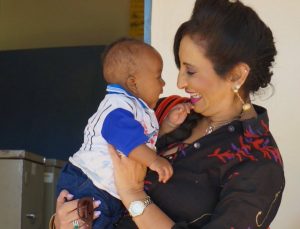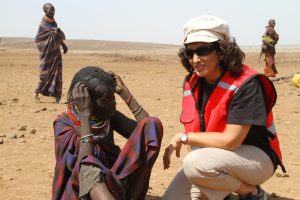Tell us about your childhood, education and your transition into employment
I was born in Nanyuki and went to school there as well as Limuru and then the UK. My parents
owned the Sportsmans Arms Hotel and looking back I guess my journey as an entrepreneur
began when at the age of 15 I set up a barbecue section of the hotel on weekends. The seed
money was from my folks, but after that I was on my own. I would grill meat every weekend,
hire extra staff, advertise and ensure I made a profit and then the barbecue was over!
I joined Barclays Bank of Kenya after returning from the London School of Journalism.
Entrepreneurship is not something you suddenly choose to do or pursue. It is something you are
called to do – a pathway you are called to follow. It’s a calling. In 1997 I left an incredible 14
years as head of corporate affairs at Barclays Bank of Kenya and set up Gina Din Corporate
Communications. It was incredibly exciting to see my name in my logo, the signboard on the
road and my business cards were just awesome. Of course I began to hand them out to everyone
I knew and was thrilled at the prospect of having lots of free time and extra cash. How naive I
was! Entrepreneurship is not cool, it’s not sexy and it’s totally uncomfortable. It can at times be
boring and grueling, but we never really see that part of the movie. We tend overromanticise
being an entrepreneur and whilst I wouldn’t change my life for anything, I wouldn’t say it’s as
easy as many people think. Most people only see the edited movie when actually there’s a lot of
footage that’s never seen.

How did you get into the Public Relations industry?
I got into PR by default. I studied journalism but when I came back, I felt a little disillusioned by
the media at that time. Barclays were about to go public and had a short term contract for
someone to head the PR function. The short term turned out to be an incredible 14 years of
wonderful experiences as well as the opportunity to interact with the most successful business
leaders in Kenya at that time. It was the beginning of what has become a very eventful journey.
How was ‘Gina Din Group’ started?
As I said earlier I started my company 20 years ago this year. According to Bloomberg, 8 out of
10 entrepreneurs who start businesses fail within the first 18 months. It’s one of those things
where when you are climbing a mountain, you are so focused on climbing you forget the energy
the climb takes or indeed what you have needed to navigate on your way up. I am still climbing,
but I do feel celebrating 20 years this year is a good time to catch our breath and be very proud
of what we have achieved.

Which corporate brands have you worked with and what did you learn?
We have probably handled about 80% of corporate Kenya. Each of them has taught me a little bit
about their own particular industry which is a fantastic experience. Being able to look at various
industries through a very unique lens is something not everyone gets to do. I feel very grateful
and blessed.
What have been your challenges and achievements through the years?
That’s an interesting question. I believe the Gina Din Group was a disruptor in the PR industry.
We set the agenda that other people now try to copy. Disruption isn’t just doing things in a
different way or in a way that doesn’t resonate..It’s not an idea that just stays as an idea, or
becomes a one off, because that’s more of a stunt. Being disruptive is about changing the game,
and the way the game is played. There were un-met market needs that incumbents weren’t
addressing because most of them were actually advertising companies that were so broad in their
approach to the market that they were missing those fundamental pockets of need. Compared to
advertising in Kenya, PR was definitely a late bloomer and as with most giddy adolescents, the
Gina Din Group went about learning all the rules and then promptly breaking them and setting
up our own. One of the challenges we had was trying to get the corporates we worked with to do
things differently. Because we were such disruptors, we were taking many of our partners outside
of their comfort zones. Starting your own business is scary stuff and I think most entrepreneurs
will resonate with the sense of fear that goes with that. I have to admit I spent a big part of my
journey absolutely petrified. The older I have become, the more knocks I have had, the more
resilient I have become. The entrepreneurial paradox is this: the things that make most people
feel safest are exactly what put us at the greatest risk. Slowing down and being conservative will
ultimately lead to less compelling thinking and less business.

Therefore, we must embrace fear. I have had the honour of watching my business mentors
constantly dance simultaneously with both fear and possibility. I am still learning the steps,
intend to master them and dance so that no one even sees the fear. I am a dreamer and believe in
chasing my dreams. Fear is the one thing that immobilises ones dreams. I am so determined to
learn that dance! As I mentioned, of course we have experienced some failure, every
entrepreneur has, but we also have had a good measure of success. We are the most awarded
agency in the region and work with incredible brands. I still have so many “pinch me” moments
when we see companies we partner with do things that challenge the status quo.

How do you juggle between family and your work?
I don’t think I have done an interview that doesn’t ask this question. Given that my children were
6 and 1 when I started my business, there was quite a bit of juggling going on. Between work,
sleep, family, fitness, and friends my early years were pretty intense. I’m afraid my friends and
my fitness regime fell by the wayside. I focused on building my business and raising my family
and even then there were times that was pretty unbalanced too. To kick ass and build something,
you are going to have to forgo stuff at times. I guess the question really is if one wants it badly
enough. Thank God my friends have and continue to forgive me, as do my incredible children
and I am fitter now than I was when I started my business.

What does your work as the United Nations Population Fund (UNFPA) Goodwill ambassador and Kenya Red Cross Ambassador entail?
I have been so honoured with these roles.
The work with UNFPA revolves around advocacy for women’s rights. We work towards
promoting gender equality, maternal health and women and youth empowerment. I lend my
voice and use my platform to sensitize the public about what more can be done. Recently the
government announced that they would be providing free sanitary pads for secondary school
girls in Kenya. This is a big win for all of us at UNFPA as it is something we have been
championing for quite a while.

As Goodwill Ambassador of the Red Cross (the first in Africa) I help raise awareness and funds
for the various initiatives we are working toward. This year we have been pushing Kenyans to
donate toward the famine relief. This means starting conversations on social media, attending
meetings and events, going on field trips to visit the areas we are trying to reach and talking to
the people on the ground. It’s very fulfilling work particularly when you see the impact it has on
people’s livelihoods but I still feel sad knowing nearly three million face the risk of starvation
unless there’s additional intervention.

How have you worked with young people most especially those who are determined to
make a positive difference in their lives and their country?
I have my own foundation, the Gina Din Foundation that aims to mentor young people across the
continent to be the best version of themselves. We get involved with a number of youth
activities, often involving sport as well as individual mentorship. It’s early days and baby steps. I
believe one must actually start as opposed to simply think about starting.
What would you like to see young Africans achieve in terms of entrepreneurship in the
next ten years?
Africa is clearly the new frontier in terms of opportunities and growth. I feel so sad when I see
most of the international news on Africa focus on famine, civil war, corruption, conflict and
disease, yet we have incredible success stories on the continent. Africa represents a prime case
where the reality and opportunity are much better than the perception. Africa has some of the
world’s fastest-growing economies and a young and rapidly growing population. However a
consistent trend in young graduates leaving or failing to return home at the end of their studies is
an increasing threat for the continent’s social, economic, environmental and technological progress. I go to lots of events on African entrepreneurship. But what sort of entrepreneurs are
being discussed? An individual selling tomatoes by the side of the road faces different obstacles
to a factory owner looking to export their goods internationally. We need to look at different
solutions for different sorts of entrepreneurs. However, one thing is for sure: across the board
business owners will only thrive in an environment that recognises the need for entrepreneurs to
be supported.

